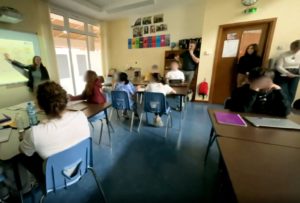Embracing Imperfection: A Teacher's Perspective on Risk-Taking and Learning

Sarah Steward
Published:
Dear Colleagues,
I want to share a candid reflection on something we rarely discuss openly: what happens when a lesson doesn’t go exactly as planned?
The Unexpected Lesson
During a recent learning lab, I experienced one of those moments that every teacher both fears and ultimately learns from. The lesson plan seemed to unravel before my eyes. Students struggled, engagement wavered, and I could feel the frustration from both the students and the observers. The aim of the lesson was to demonstrate inquiry in a mid-unit lesson and what my colleagues witnessed both on camera and in person most definitely did not hit that objective.
Turning Challenges into Opportunities
But here’s the crucial lesson: risk-taking in education isn’t about perfection—it’s about resilience. When things don’t go smoothly, we have a unique opportunity to:
– Demonstrate adaptability
– Model problem-solving skills
– Show students that learning is a dynamic process
What did I learn that day?
I also had the opportunity to watch my colleagues in action that day. I learnt many things from seeing them in their respective divisions and it was great to work with everyone during the workshop. Inquiry is an extremely powerful learning tool and it has a place in every lesson BUT what was planned in my class did not allow students to use their inquiry skills to help their learning that day.
Would I volunteer for a learning lab again?
Absolutely yes!
In fact I had the pleasure of being an observer just a few days ago for a colleague. I got to see so much and learn from so many.
My ‘unexpected lesson’ was my first experience of learning labs, I have never done one in over 17 years of teaching. I plan to do many more and really enjoy collaborating with my peers. In some of the schools I have worked in there would be less empathy for when taking a risk goes wrong and I am grateful that AAS is a place where I can try again.
My next steps
The students and I had a very frank discussion about how it went, they also shared their discomfort with the lab, and I think in my particular classroom limiting the number of visitors at once would be better for future labs.
My students were not ready at the start of class – we have now started a 3 last question system. This allows students to come straight in and have a system in place to be ready. This also allows them to engage in prior learning, there are 3 short questions from last lesson last week and last trimester to get them started and help to manage the disjointed way they enter class.
Don’t be afraid to call it. If it hadn’t been a designed learning lab with a guest teacher I would not have carried on with many of the activities but the pressure of all the observers and the plan meant I rushed through even though my gut feeling was telling me it wasn’t working.
I also reflect on a bigger question. “Why are our students so afraid of failure?”. The students were so anxious about getting the task wrong, especially in front of so many teachers, they froze up and found it hard to start.
Key Takeaways
Unexpected moments are learning opportunities – this was my first ever learning lab, and while it was not the experience I expected I will be trying again.
Vulnerability can be a powerful teaching tool – sharing with students the reflection helped us to move forward and build our relationship.
Resilience matters more than a flawless performance. We often emphasize this to our students but struggle with it ourselves.
Closing Thoughts
To my fellow educators: Embrace the unexpected. Our imperfections make us human, and more importantly, they make us better teachers.
I would invite you all in to see how Inquiry can really look in HS Science lessons, so please come by anytime you like.
Warmly,
Sarah Steward
HS/IB Science teacher, Anglo-American School of Sofia
—
Remember: Every stumble is just another step in our educational journey.

